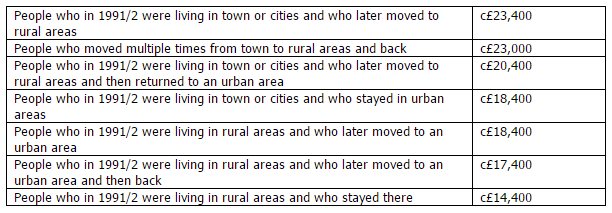Growing up in rural areas leads to a lower earnings 'pay penalty', research says
People who grow up in rural areas earn less than their urban equivalents even after they move to towns and cities for work, research says.
In the first analysis of its kind, Dr Martin Culliney found that they suffered a "pay penalty into adulthood".
Dr Culliney, of Sheffield Hallam University, studied survey results on the income of 1,594 people tracked from 1991 to 2009. They were aged 15-24 at the beginning of the period and up to 42 at the end.
He found that in 2008/9, the net take-home pay for those living in rural areas was around £900 less a year than those living in towns and cities.
Even when people who grew up in rural areas later began working in towns and cities, the net take-home pay for full-time workers stayed less than for those who had grown up in urban areas.
In an article in the journal Work, employment and society, Dr Culliney ranked people working full-time by their median average take-home pay:
- in 2008/9 the best paid were those who had started off in a town or city and then moved to a rural area – their net take-home pay was around £23,400 a year for those working full-time.
- those who stayed in rural areas or moved from rural to urban areas had the lowest net take-home pay, around £14,400 to £18,400 a year for full-time workers.
"Young people who remain in rural locations earn less money than their urban peers," said Dr Culliney. There were fewer jobs and a limited range of careers in rural areas, he said.
Those who were prepared to move to towns and cities earned more than those who stayed in rural areas, but less than those brought up in urban areas, he said.
"Simply being of rural origin brought respondents less pay across the whole 18-year observation window."
He said that the findings could be interpreted as "conveying a rather fatalistic message" that young people suffered a "pay penalty into adulthood" even if they relocated to towns and cities. However, this was reduced if they moved to urban areas to work.
Dr Culliney said that overall the average earnings of people working in rural areas were higher than those in towns and cities, but this was because older people earned more in rural areas – younger people were poorer.
He said this was the first research to compare the earnings of people who moved from rural to urban areas and vice versa. "Such comparisons of rural and urban locations have not been conducted before in Britain."
Dr Culliney used data from the British Household Panel Survey from 1991/2 to 2008/9. The same people, aged 15-24 in 1991/2, were tracked each year. The sample size began at 1,594 and this fell to 806 by 2009. The sample is statistically representative of the UK.
The median average net take-home pay for full-time workers in 2008/2009 was:

More information: M. Culliney. Escaping the rural pay penalty: location, migration and the labour market, Work, Employment & Society (2016). DOI: 10.1177/0950017016640685
Journal information: Work, Employment and Society
Provided by British Sociological Association
















